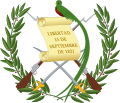| This article is part of a series on |
| Politics of Guatemala |
|---|
 |
Parliamentary elections were held in Guatemala for half the seats in Congress between 16 and 18 January 1953. The Revolutionary Action Party won a plurality of seats.
| This article is part of a series on |
| Politics of Guatemala |
|---|
 |
Parliamentary elections were held in Guatemala for half the seats in Congress between 16 and 18 January 1953. The Revolutionary Action Party won a plurality of seats.
The four other parties were opposition parties, whilst all independents were pro-government.
| Party | Votes | % | Seats | |
|---|---|---|---|---|
| Revolutionary Action Party | 22 | |||
| Party of the Guatemalan Revolution | 16 | |||
| National Renovation Party | 7 | |||
| Guatemalan Party of Labour | 4 | |||
| Four other parties | 5 | |||
| Independents | 4 | |||
| Total | 58 | |||
| Total votes | 241,318 | – | ||